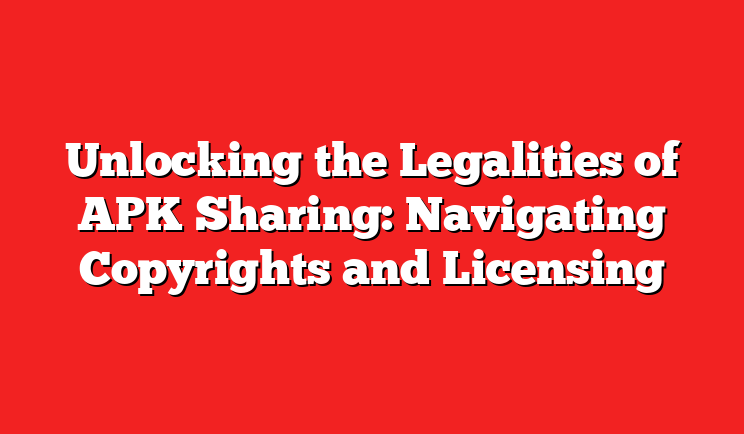In the fast-paced world of digital technology, the sharing and distribution of applications have become commonplace. One such method is through APK sharing, which involves the transfer of Android application packages (APKs) between devices. However, behind this seemingly innocuous act lie complex legal considerations. In this article, we delve into the legalities of APK sharing, focusing particularly on copyrights and licensing.
Download Vidmate APK from here.
Understanding Copyrights
At the heart of the matter lies the issue of copyrights. When developers create an application, they automatically hold the copyright to that software. This means that they have the exclusive right to reproduce, distribute, and adapt their work. When users engage in APK sharing without the developer’s consent, they may be infringing upon these rights.
Navigating Licensing
In addition to copyrights, licensing also plays a crucial role in the APK sharing landscape. Developers often choose to license their software under specific terms, dictating how it can be used and distributed. Common licensing models include open source licenses like the GNU General Public License (GPL) or proprietary licenses. Users must respect these licensing agreements when sharing APKs to avoid legal repercussions.
The Importance of Legality
Ensuring the legality of APK sharing is paramount for both developers and users alike. For developers, unauthorized distribution of their applications can result in lost revenue and damage to their brand reputation. Conversely, users who engage in illegal APK sharing may find themselves facing legal action or inadvertently downloading malware-infected apps.
Best Practices for Legal APK Sharing
To navigate the complex landscape of APK sharing, it’s essential to adhere to best practices:
Respect Copyrights:
Always obtain permission from the developer before sharing their APKs.
Verify Licensing:
Ensure that the APK is distributed under a license that permits sharing, and adhere to any conditions stipulated by the license.
Use Trusted Sources:
Obtain APKs from reputable sources to minimize the risk of downloading malicious software.
Stay Informed:
Keep abreast of changes in copyright law and licensing agreements to ensure compliance.
Conclusion
In conclusion, the legalities of APK sharing revolve around respecting copyrights and adhering to licensing agreements. By understanding these concepts and following best practices, both developers and users can navigate the APK sharing landscape responsibly. Ultimately, prioritizing legality not only protects intellectual property rights but also fosters a safer and more trustworthy digital ecosystem.
FAQs
Is APK sharing legal?
APK sharing can be legal if done in accordance with copyright law and licensing agreements. However, unauthorized sharing may infringe upon developers’ rights.
What are copyrights in the context of APK sharing?
Copyrights grant developers exclusive rights to their software, including the right to reproduce and distribute it. Users must respect these rights when sharing APKs.
How do licensing agreements affect APK sharing?
Licensing agreements dictate how software can be used and distributed. Users must adhere to the terms of these agreements when sharing APKs to avoid legal issues.
Can I share APKs of paid apps?
Sharing APKs of paid apps without permission from the developer is likely to violate copyright law and licensing agreements. It’s essential to obtain proper authorization before sharing such APKs.
Are there legal consequences for sharing APKs?
Sharing APKs without proper authorization can lead to legal consequences, including lawsuits for copyright infringement. It’s crucial to respect developers’ rights and adhere to licensing agreements.
How can I ensure the legality of APK sharing?
To ensure legality, always obtain permission from the developer before sharing their APKs. Additionally, verify that the APK is distributed under a license that permits sharing and adhere to any conditions stipulated by the license.
Where can I find APKs legally?
APKs can be legally obtained from authorized sources such as the Google Play Store or the official website of the app developer. Avoid downloading APKs from unofficial or untrusted sources to minimize the risk of downloading malware-infected apps.
What should I do if I suspect an APK is illegal?
If you suspect that an APK is illegal or infringes upon copyrights, refrain from sharing or using it. Instead, report the issue to the relevant authorities or the developer for further investigation.
Can I modify and share open-source APKs?
Open-source APKs are often distributed under licenses that permit modification and sharing. However, it’s essential to review the specific terms of the license and comply with any requirements for attribution or sharing modifications.
How do copyright laws vary internationally for APK sharing?
Copyright laws vary from country to country, so it’s crucial to understand the legal framework in your jurisdiction regarding APK sharing. Consulting with legal experts can provide clarity on international copyright issues related to APK sharing.

